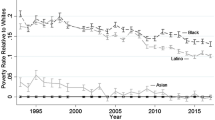Abstract
This paper analyzes the effectiveness of the Earned Income Tax Credit (EITC) on poverty transitions, with an emphasis on native-born African–Americans and immigration. A probit model is estimated using data from the Current Population Survey (CPS), which evaluates the impact of EITC participation and immigration on transitions out of poverty. The EITC is found to be a useful tool in combating poverty and is effective for African–Americans, though only for women. More importantly, the results show that the implementation of state-level EITCs can mitigate the adverse effects of immigration for native-born African–Americans.
Similar content being viewed by others
Notes
Though this debate has not been resolved.
Review of Black Political Economy Vol.23, Special Issue 2003
Programs to perform this matching are available from the NBER website. The programs itself do not remove the matches, but provide guidance towards how to remove the invalid matches.
The change in earned-income-to-needs ratio is continuous so I estimate a standard least-squares regression.
I also split the sample further by gender but the effects did not differ.
References
Ai C, Norton EC. Interaction terms in logit and probit models. Econ Lett. 2003;80(1):123–9.
Baughman R, Dickert-Conlin S. Did expanding the eitc promote motherhood? Am Econ Rev Papers and Proceedings. 2003;93(2):247–51.
Bean F, Fossett MA, Park KT. Labor market dynamics and the effects of immigration on African–Americans. In: Jaynes G, editor. Immigration and race: new challenges for american democracy. New Haven: Yale University Press; 2000. p. 143–62.
Bean F, Stevens G. America’s newcomers and the dynamics of diversity. New York: Sage; 2003.
Borjas G, Grogger J, Hanson GH. Immigration and African–American employment opportunities: the response of wages, employment, and incarceration to labor supply shocks NBER Working Paper No. 12518; 2006.
Burman L, Kobes D. EITC reaches more eligible families than TANF, Food stamps Tax Notes March 17, 2003.
Carasso A, Steuerle CE. Projected distribution of EITC claims in 2003. Tax Notes July 19, 2004.
Card D. Is the new immigration really so bad? NBER Working Paper No. 11547; 2005.
Cherry R. Immigration and race: what we think we know. Rev of Black Polit Econ. 2003;31(1):157–84.
Eissa N, Hoynes HW. Behavioral response to taxes: lessons from the EITC and labor supply. In: Poterba J, editor. Tax policy and the economy vol.20. Cambridge: The MIT; 2006.
Ellwood D. The impact of the earned income tax credit and social policy reforms on work, marriage, and living arrangements. Natl Tax J. 2000;53(4):1063–105.
Hotz VJ, Mullin CH, Scholz JK. Examining the effect of the earned income tax credit on the labor market participation of families on welfare. Working Paper; 2005.
Hoynes HW, Page ME, Stevens AH. Poverty in america: trends and explanations. national bureau of economic research. Working Paper No. 11681; 2005.
Johansson, H. Shulman S. Immigration and the employment of African-American workers. Rev Black Polit Economy. 2003;31(1–2):95–110.
Maag E. Disparities in knowledge of the EITC. Tax Notes March 14, 2005.
Madrian BC, Lefgren LJ. An approach to longitudinally matching population survey (CPS) respondents. J Econ Soc Meas. 2000;26(1):31–62.
Meyer B. Labor supply at the extensive and intensive margins: the EITC, welfare, and hours worked. Am Econ Rev Papers and Proceedings 2002;92(2):373–9.
Meyer B, Rosenbaum D. Welfare, the earned income tax credit, and the labor supply of single mothers. Q J Econ. 2001;116(4):1063–114.
Nagle A, Johnson N. A hand up: how state earned income tax credits help working families escape poverty in 2006 center on budget and policy priorities. Working Paper; 2006.
Neumark D, Wascher W. Using the EITC to help poor families: new evidence and a comparison with the minimum wage. Natl Tax J. 2001;54(2):281–317.
Neumark D, Wascher W. Minimum wages, the earned income tax credit, and employment: evidence from the post-welfare reform era. National Bureau of Economic Research Working Paper #12915; 2007
Ruggles S, Sobek M, Alexander T, Fitch CA, Goeken R, Hall PK, et al. Integrated public use microdata series: version 3.0 [machine-readable database]. Minneapolis: Minnesota Population Center; 2004. [producer and distributor].
Wilson F, Jaynes G. Migration and the employment and wages of native-born and immigrant workers. Work Occup. 2000;27(2):135–67.
Acknowledgements
The author would like to thank the editor and an anonymous referee for comments and helpful suggestions. The research also benefitted from the National Poverty Center Workshop on Analyzing Poverty. This work was supported by a grant from the University of Toledo’s Summer Research Award and Fellowship Program.
Author information
Authors and Affiliations
Corresponding author
About this article
Cite this article
Ajilore, O. The Impact of the Earned Income Tax Credit on Poverty: Analyzing the Dimensions by Race and Immigration. Rev Black Polit Econ 35, 117–127 (2008). https://doi.org/10.1007/s12114-008-9030-2
Received:
Accepted:
Published:
Issue Date:
DOI: https://doi.org/10.1007/s12114-008-9030-2




